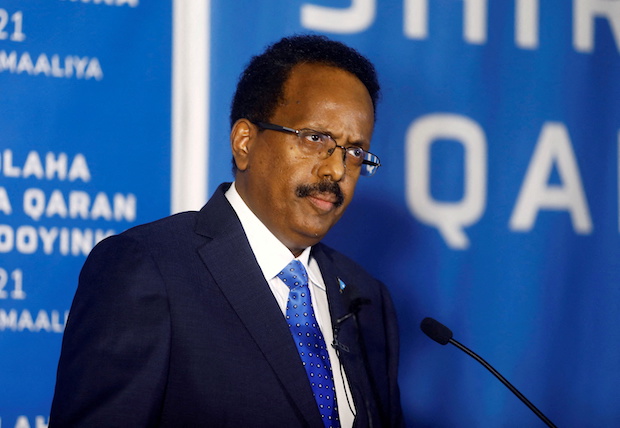
Somalia’s President Mohamed Abdullahi Mohamed addresses delegates at the Somali election negotiation in Mogadishu, Somalia May 27, 2021 (REUTERS/Feisal Omar)
MOGADISHU — Blasts rang out on Sunday in the Mogadishu airport area where parliament was meeting to choose Somalia’s new president in a vote essential to keep foreign aid coming to the impoverished nation tortured by three decades of civil war.
Half a dozen residents and a Reuters reporter heard what sounded like mortar shells. Somalis are used to frequent attacks on state institutions from Islamist insurgents.
“I counted three big sounds of mortar shells landing in the direction of the airport. We are shocked to hear those sounds of mortars when Mogadishu is under a complete curfew. Who is firing them?” said one of the residents, Halima Ibrahim.
There was no immediate word on any damage or casualties.
One source inside the heavily-guarded airport hangar, where the vote was taking place, told Reuters no explosions had been heard from inside, though there was a tumult of noise during counting from a first round of votes by lawmakers.
In a crowded field of 35 aspirants, former presidents Sharif Sheikh Ahmed and Hassan Sheikh Mohamud were the frontrunners, according to analysts, even though their administrations had failed to stem corruption or conflict.
The United Nations-backed vote was delayed by over a year due to squabbling in government but must be held this month to ensure a $400 million International Monetary Fund program.
It takes place during Somalia’s worst drought in four decades, and against a depressingly familiar background of attacks by al Shabaab rebels, in-fighting among security forces, and clan rivalries.
Skepticism
Though just holding the process was a success of sorts, many in the country of 15 million people were skeptical of real progress. Leading candidates were old faces recycled from the past who had done little to help them, and such votes were traditionally dominated by bribery, they complained.
Incumbent President Mohamed Abdullahi Mohamed, nicknamed “Farmaajo” for his reputed love of Italian formaggio cheese, looked unlikely to be reelected after losing support in last month’s parliamentary vote.
Somalia is still unable to hold a direct popular vote due to insecurity, with the government having little control beyond the capital. African Union peacekeepers guarded the site within an Iraq-style “Green Zone” where the politicians met.
Two or three rounds of voting were expected, with a result likely by late evening.
“The only hope we have is this election,” said medical student Nur Ibrahim.
“There is no life in Somalia. We study and then get bombed by terrorists. If there is no peace, education has no use.”
As well as former presidents Ahmed (2009-2012) and Mohamud (2012-2017), the head of the semi-autonomous region of Puntland, Said Abdulahi Deni, also has a good chance, analysts say.
Only one woman was standing, former foreign minister Fawzia Yusuf Adam, but was not expected to garner significant support in the strictly patriarchal society.
Ahmed, a former Islamist, took over a Western-backed transitional government in 2009, establishing the national army and helping push al Shabaab out of Mogadishu, though it came back strongly in the regions. The other former president, Mohamud, was a peace activist and academic.
RELATED STORIES
Somalia’s president suspends prime minister pending investigation
Somalia accuses Somaliland of forcibly evicting hundreds
Civilians flee homes amid fears of fresh Mogadishu violence